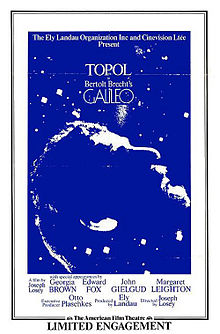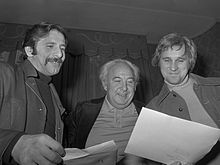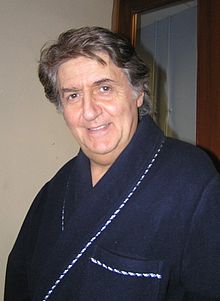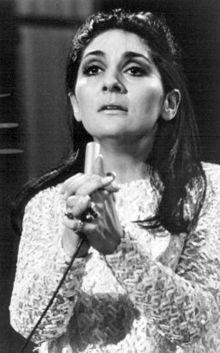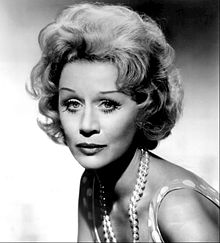Galileo (1974 film)
Galileo is a 1975 biographical film about the 17th century scientist Galileo Galilei, whose astronomical observations with the newly invented telescope led to a profound conflict with the Roman Catholic Church. The film is an adaptation of Bertolt Brechts play of the same name. The film was produced and released as part of the American Film Theatre, which adapted several plays for a subscriptiondriven series of films from 1973 to 1975. Brechts play was recently called a masterpiece by veteran theater critic Michael Billington, as Martin Esslin had in 1960. The films director, Joseph Losey, had also directed the first performances of the play in 1947 in the US with Brechts active participation. The film is fairly true to those first performances, and is thus of historical significance as well.
Joseph Losey had a long relationship with Bertolt Brecht that commenced in the 1930s and culminated with the 1947 stage performances of Galileo. After these, Losey mainly worked as a film director. Losey was blacklisted in the US in the early 1950s due to his political activities, which effectively ended his career in the US film industry. He emigrated to England, where he was able to reestablish his career. Over the years he made several efforts to produce a film based on Brechts play. These were finally realized when Losey was engaged to direct a film of Galileo for the 19741975 season of the American Film Theatre. In its two seasons, American Film Theater presented fourteen films based on wellknown plays. By design, these were not films of stage productions they were plays translated to the film medium, but with complete faithfulness to the original play script. While the films were intended for US movie theaters, Galileo was produced in England.The screenplay for Galileo was written by Barbara Bray and Losey. Bray had a long career as an editor, translator, and critic. She is also noted as the longtime companion and mistress of Samuel Becket, who won the Nobel Prize in Literature in 1969. Besides Galileo, she wrote two other screenplays with Losey. Their screenplay for Galileo relies primarily on the American version of Brechts play that was first performed in 1947. This English language version was written between 1944 and 1947 by Brecht with Charles Laughton, his collaborator and translator. The play was produced in Los Angeles, California and then in New York City, with Laughton a famed film actor starring as Galileo. The play was first published in 1952. Bray and Loseys screenplay made changes in this version that reflect the ultimate 1956 Berlin version in German, as well as the English translation of the Berlin version and additional materials published by Ralph Manheim and John Willett in 1972. Scenefrom the 1947 play w
Source: Wikipedia

